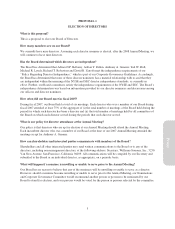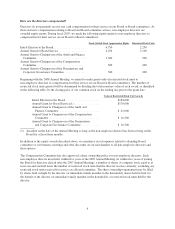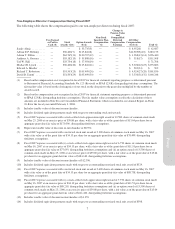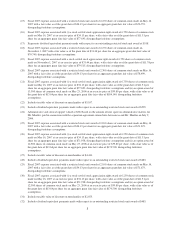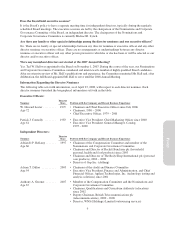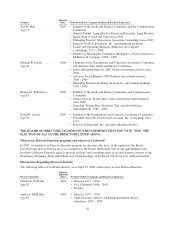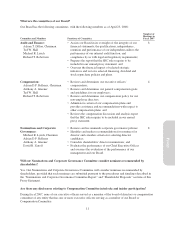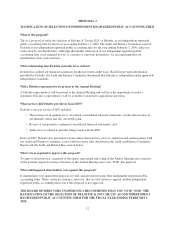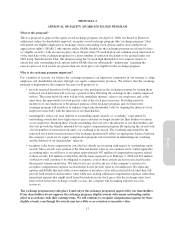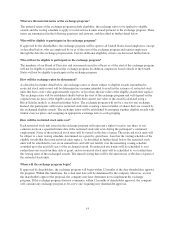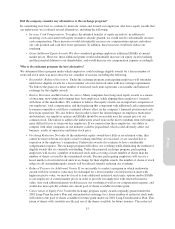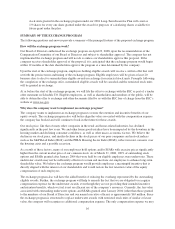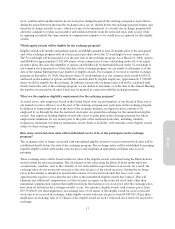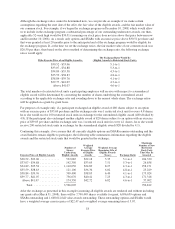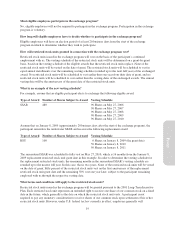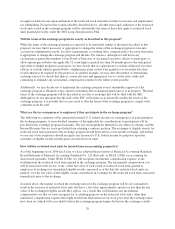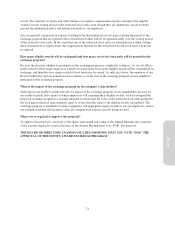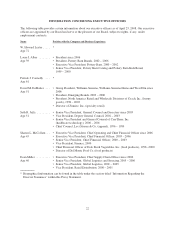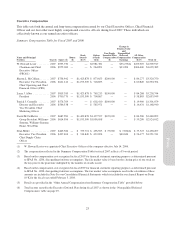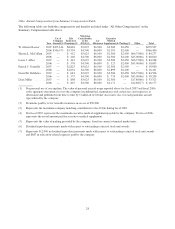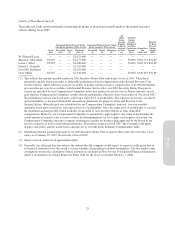Pottery Barn 2007 Annual Report Download - page 105
Download and view the complete annual report
Please find page 105 of the 2007 Pottery Barn annual report below. You can navigate through the pages in the report by either clicking on the pages listed below, or by using the keyword search tool below to find specific information within the annual report.
Did the company consider any alternatives to the exchange program?
In considering how best to continue to motivate, retain and reward our employees who have equity awards that
are underwater, we evaluated several alternatives, including the following:
•Increase Cash Compensation. To replace the intended benefits of equity incentives, in addition to
incurring costs associated with equity incentives already granted, we would need to substantially increase
cash compensation. These increases would substantially increase our compensation expense and reduce
our cash position and cash flow from operations. In addition, these increases would not reduce our
overhang.
•Grant Additional Equity Awards. We also considered granting employees additional SSARs at current
market prices. However, these additional grants would substantially increase our equity award overhang
and the potential dilution to our shareholders, and would increase our compensation expense accordingly.
Why is the exchange program the best alternative?
We determined that a program under which employees could exchange eligible awards for a lesser number of
restricted stock units was most attractive for a number of reasons, including the following:
•Reasonable, Balanced Incentives. Under the exchange program, participating employees will surrender
underwater eligible awards for a lesser number of restricted stock units with new vesting requirements.
We believe the grant of a lesser number of restricted stock units represents a reasonable and balanced
exchange for the eligible awards.
•Restore Retention and Motivation Incentives. Many companies have long used equity awards as a means
of attracting, motivating and retaining their best employees, while aligning those employees’ interests
with those of the shareholders. We continue to believe that equity awards are an important component of
our employees’ total compensation, and that replacing this component with additional cash compensation
to remain competitive could have a material adverse effect on the company’s financial position and cash
flow from operations. We also believe that in order to have the desired impact on employee motivation
and retention, our employee options and SSARs should be exercisable near the current price of our
common stock. The failure to address the underwater award issue in the near to medium term will make it
more difficult for us to retain our key employees. If we cannot retain these employees, our ability to
compete with other companies in our industry could be jeopardized, which could adversely affect our
business, results of operations and future stock price.
•Overhang Reduction. Not only do the underwater equity awards have little or no retention value, they
cannot be removed from our equity award overhang until they are exercised, or are canceled due to
expiration or the employee’s termination. Underwater awards also continue to have considerable
compensation expense. The exchange program will reduce our overhang while eliminating the ineffective
eligible awards that are currently outstanding. Under the proposed exchange program, participating
employees will receive a number of restricted stock units covering a lesser number of shares than the
number of shares covered by the surrendered awards. Because participating employees will receive a
lesser number of restricted stock units in exchange for their eligible awards, the number of shares of stock
subject to all outstanding equity awards will be reduced, thereby reducing our overhang.
•Reduced Pressure for Additional Grants. If we are unable to conduct a program in which underwater
awards with low incentive value may be exchanged for a lesser number of restricted stock units with
higher incentive value, we may be forced to issue additional restricted stock units, options and/or SSARs
to our employees at current market prices in order to provide our employees with renewed incentive
value. Any such additional grants would increase our overhang as well as our compensation expense, and
would also more quickly exhaust our current pool of shares available for future grant.
•Conservation of Equity Pool. Under the exchange program, equity awards originally granted under the
2001 Long-Term Incentive Plan and surrendered in exchange for a lesser number of restricted stock units
will return to the pool of shares available for future grant under our 2001 Long-Term Incentive Plan. This
return of shares will constitute an efficient use of the shares available for future issuance. The restricted
15
Proxy


